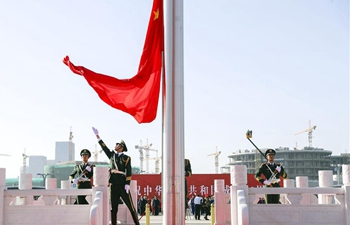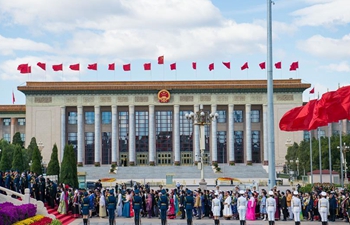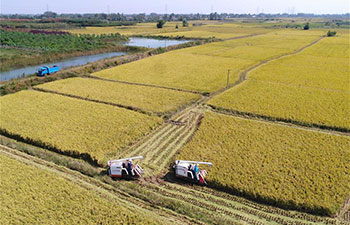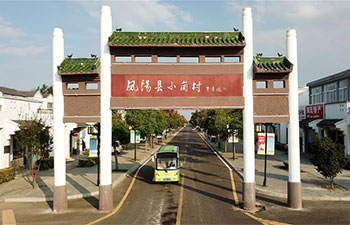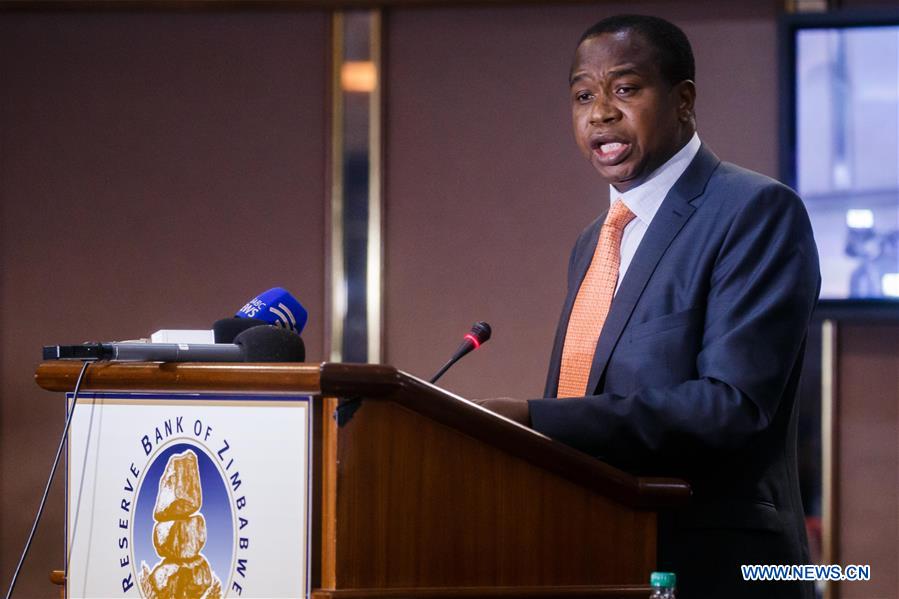
Zimbabwean Finance Minister Mthuli Ncube presents mid-term fiscal policies in Harare, Zimbabwe, Oct. 1, 2018. Zimbabwe's economy is projected to grow by about six percent in 2018, up from the initial projection of 4.5 percent due to several economic reforms that have been implemented by the new government of President Emmerson Mnangagwa, Mthuli Ncube said on Monday. (Xinhua/Shaun Jusa)
HARARE, Oct. 1 (Xinhua) -- Zimbabwe's economy is projected to grow by about six percent in 2018, up from the initial projection of 4.5 percent due to several economic reforms that have been implemented by the new government of President Emmerson Mnangagwa, finance minister Mthuli Ncube said Monday.
Central bank governor John Mangudya also said the strong growth in agriculture and mining would drive growth this year, but stressed the need for Zimbabwe to ratchet up the reforms and accelerate re-engagement with international financial institutions in order to secure fresh offshore lines of credit to revive the distressed economy.
The two were speaking while jointly presenting their mid-term fiscal and monetary policies respectively.
"If this six percent is realized, then Zimbabwe will join what I call the six percent club, a grouping of countries in Africa that are growing at six percent and above," the minister said.
He said the economic challenges facing Zimbabwe were not insurmountable but required urgent and bold decisions.
Among the challenges were foreign currency and cash shortages, an unsustainable high budget deficit and current account deficit, emerging inflationary pressures, infrastructure deficiencies and weak social services delivery, Ncube said.
He said the high budget deficit was destabilizing financial sector stability and crowding out the private sector, resulting in suppressed national production.
"The (high budget deficit) has also increased money supply in the economy, translating into exchange rate misalignment and inflationary pressures," he said.
Government's domestic debt jumped from less than 300 million U.S. dollars in 2012 to 9.5 billion by August 2018 while foreign debt stood at 7.4 billion dollars.
In total, government debt stood at a whooping 16.9 billion dollars, the minister said.
To contain the high budget deficit, the minister said government will limit the use of the Reserve Bank of Zimbabwe's overdraft facility and also curtail RBZ advances to the government.
He said Zimbabwe was in dialogue with the World Bank, African Development Bank and the European Investment Bank to clear a combined 2.5 billion dollars that it owes the three multilateral financial institutions.
The debt ridden country was also engaging the Paris Club to restructure its 2.8 billion dollars debt arrears.
Governor Mangudya said Zimbabwe needed to take painful and tough decisions to turn around its economy, and announced a raft of measures to improve supply of forex and boost confidence in the economy.
He said despite inflationary pressures in the economy, Zimbabwe's inflation was projected to remain within the Southern African Development Community's inflation benchmark of seven percent.
The central bank had arranged for 500 million dollars in offshore lines of credit to finance critical imports as well as another 255 million dollars to prop up the economy, he said.
Mangudya gave banks up to Oct. 15 to comply with a central bank directive to allow clients to open separate Nostro and RTGS foreign currency accounts in order to preserve the value of money for generators of forex.
The governor also said drivers of foreign trucks will now purchase their fuel in Zimbabwe in U.S. dollars to curb their abuse of foreign exchange distortions on the market.
Mangudya emphasized that curbing corruption and boosting production to generate foreign currency was key to drive growth in the economy.
He also refuted claims that the central bank was dealing in the thriving parallel market for foreign currency.
Meanwhile, the finance minister said Zimbabwe should consider establishing a regional fuel dry port as a long-term solution to the fuel crisis it is facing due to the ongoing shortage of forex.
He also dissolved the board of the tax revenue collector, ZIMRA and said a new board will be announced soon.



